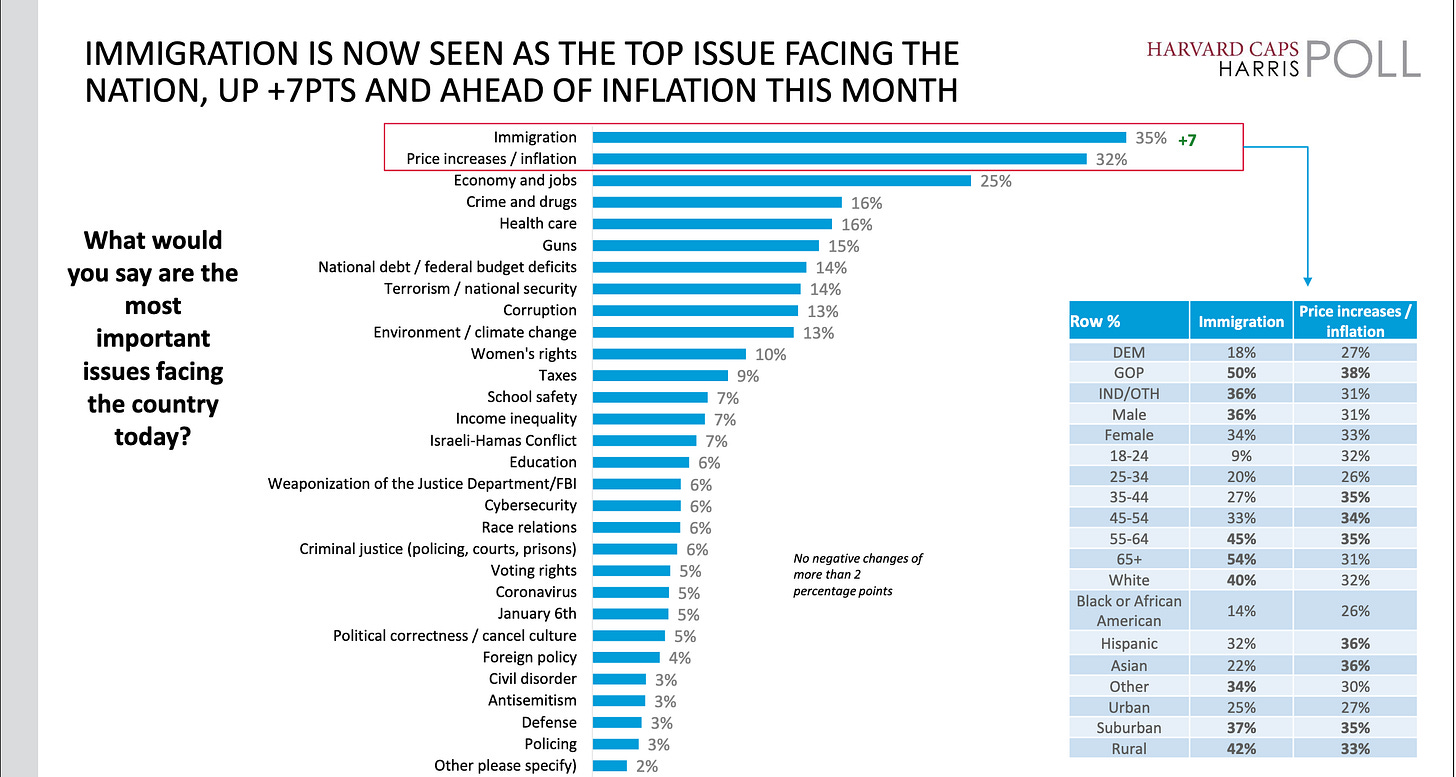Immigration has become the most pressing issue in the nation: Harvard CAPS/Harris Poll
Immigration shows a notable increase in priority.
The chart depicts results from a Harvard CAPS/Harris Poll, highlighting that immigration has become the most pressing issue in the nation, overtaking inflation by a 7-point increase, now at 35% compared to 32% for price increases/inflation. A breakdown by demographics shows that the concern for immigration is significantly higher among Republicans (GOP) at 50% compared to Democrats (DEM) at 18% and Independents/Other (IND/OTH) at 36%. The concern for inflation is more evenly distributed across political affiliations.
Age-wise, the oldest demographic (65+) shows the highest concern for immigration (54%), while the youngest (18-24) is more concerned with inflation (32%). Ethnicity-wise, White respondents show a higher concern for immigration (40%) than Black or African American (14%), Hispanic (32%), and Asian (22%) respondents.
The chart also presents other issues like the economy and jobs, crime and drugs, healthcare, and guns, considered less critical than immigration and inflation. Notably, no issue has seen a negative change of more than two percentage points, indicating a relatively stable concern across the topics listed, with immigration showing a notable increase in priority.
MORE ON IMMIGRATION
US border policy deal within reach despite efforts by Trump to derail it, senators say
By The Guardian’s Lauren Gamino.- Congressional negotiators are nearing a US border policy deal, countering efforts by Donald Trump to halt progress. Despite initial concerns after Senate minority leader Mitch McConnell seemed to withdraw support to protect Trump's political interests, lawmakers are now optimistic about the deal's prospects. McConnell had cautioned that a bipartisan agreement might weaken Trump's position in the upcoming election against Joe Biden. However, reports now indicate that McConnell is "fully onboard" with the negotiations, which could lead to changes in immigration policy aimed at decreasing migration flows and require Democratic concessions for Republican-backed aid to Ukraine and Israel. Trump has publicly urged Republicans to reject the deal unless it entirely halts what he calls an "invasion." The impasse in Congress has delayed crucial international aid, with significant consequences for Ukraine's defense against Russia. Despite Trump's opposition, some Senate Republicans advocate for addressing the border crisis immediately, criticizing Trump's strategy to delay solutions for political gain.
What’s Hiding in the Immigration & Border Deal? More Mass Surveillance
By ACLU’s Naureen Shah.- The American Civil Liberties Union (ACLU) is raising alarms about the potential expansion of the Family Expedited Removal Management (FERM) program, which accelerates the deportation of asylum-seeking families and subjects them to invasive surveillance and due process violations. FERM, operated by ICE and outsourced to a private prison company, processes asylum claims rapidly, preventing access to legal support. Families under FERM experience intense scrutiny, including mandatory ankle monitors and curfews, which cause physical and psychological distress. The ACLU condemns these practices, noting that effective alternatives like regular communication ensure court appearance without intrusive surveillance. The ACLU fears a second Trump administration would misuse FERM for mass deportations, further intimidating immigrants and stifling dissent. They advocate for comprehensive immigration reform, rejecting deals that fulfill Trump’s anti-immigrant agenda in exchange for foreign aid.
Top Issues Identified by ACLU:
Harm and denial of due process to families in FERM.
Risks of widespread surveillance under FERM, especially with a potential second Trump administration.
The physical and psychological harm caused by mandatory GPS ankle monitors.
The negative impact of home curfews on routine family activities.
The chilling effect on immigrants' participation in protests and community organizing.
The broader implications of normalizing 24-hour suspicionless surveillance.
The potential for FERM's expansion to enable mass deportations and tracking of immigrants.
The need for immigration reform that addresses court processing and provides a legal status pathway.
Opposition to immigration and border deals that align with Trump's extremist views in exchange for foreign aid.




